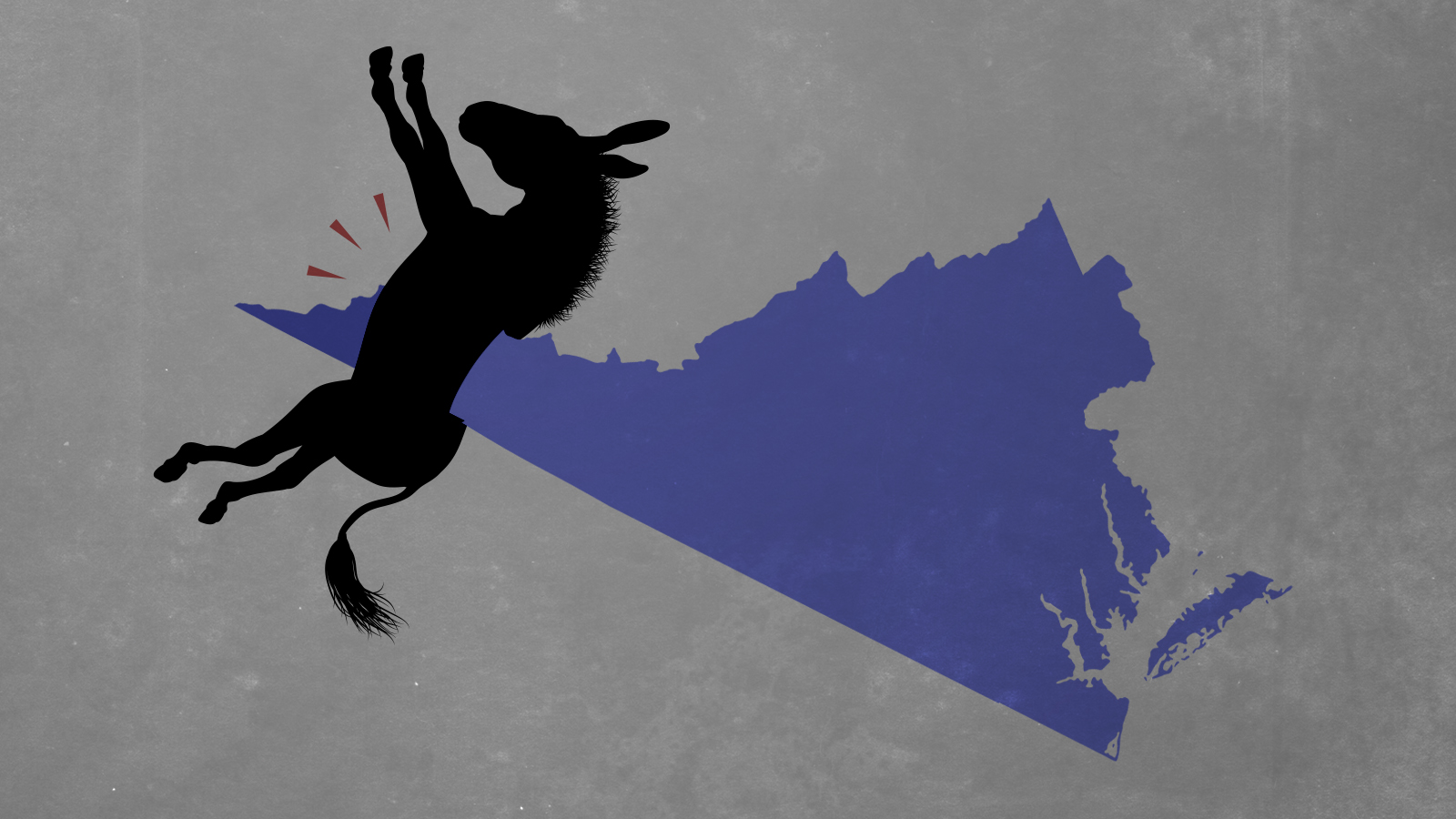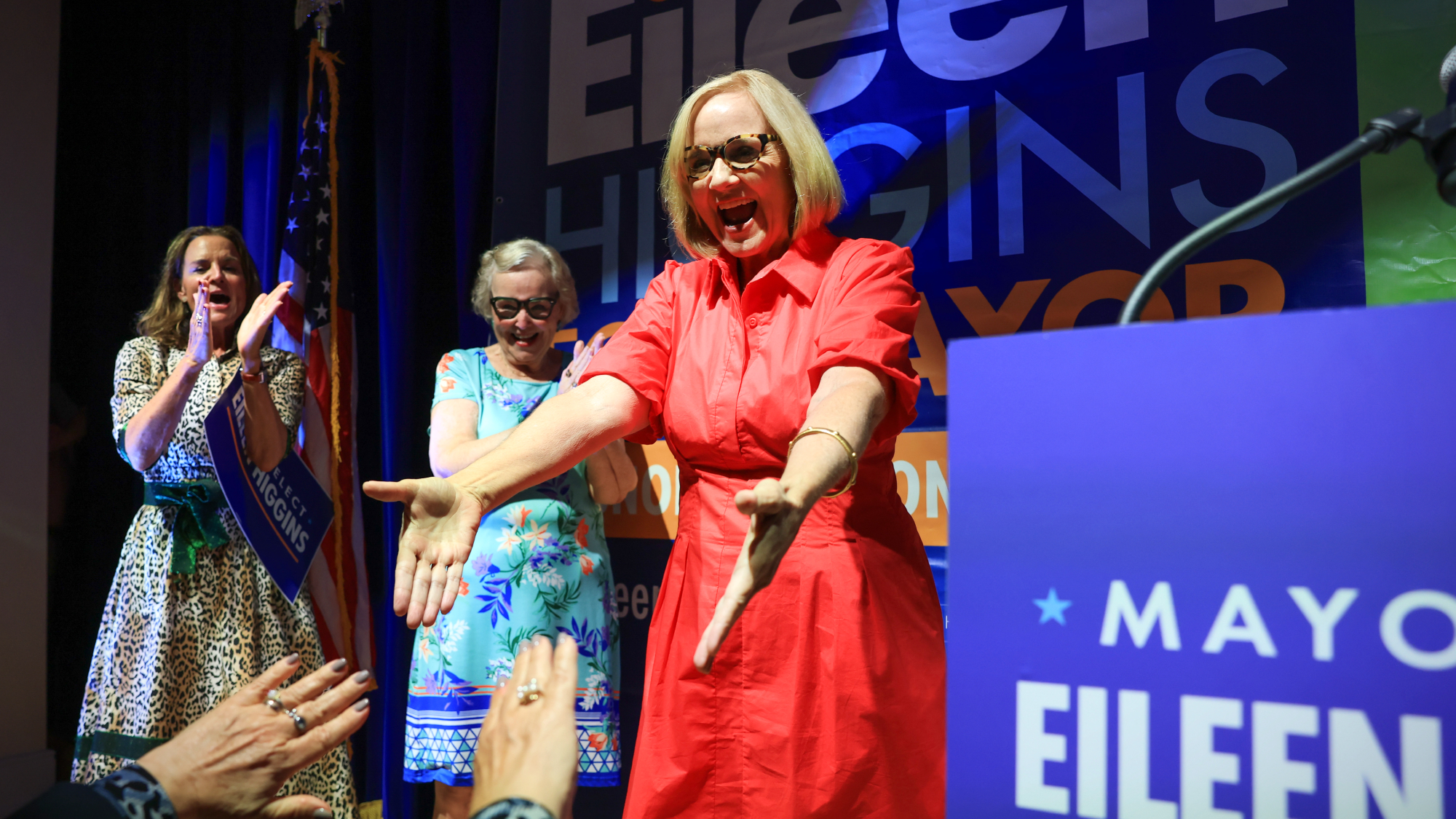Are Democrats sleeping on a political disaster in Virginia?
Virginia's state races are a bellwether for 2022. Why are Democrats ignoring them?


A free daily email with the biggest news stories of the day – and the best features from TheWeek.com
You are now subscribed
Your newsletter sign-up was successful
Virginia is having an election next month, not that you'd know it from how Democratic leadership is behaving.
General elections in Virginia happen on odd years, and this year, Virginians will elect a new governor and determine who controls the state's House of Delegates. The last two presidential elections might suggest this is a solid state for Democrats — Hillary Clinton won Virginia by over five points in 2016, and President Biden won it by 10 points in 2020. But key state races are much closer. In the 2019 election, Democrats outpaced Republicans by about 200,000 votes in House of Delegates races — but the races that decided control of the House had a combined margin of only a few thousand. This year's margins could be similarly narrow.
Virginia will also be a key test for the Democratic Party, a preview of the midterms next year. Historically, parties that control the White House struggle to turn out their voters in off-year elections — and that's especially true of Democrats, with their younger and more economically downscale voting base. If Democrats can buck that trend and maintain control of Virginia's government, it will bode well for their midterm prospects and validate Virginia Dems' strategy of pushing through their campaign agenda. Conversely, if Republicans win with their strategy of running Trumpy extremists for Virginia House seats, 2022 will look grim for Democrats, and democracy itself will be in peril in the state.
The Week
Escape your echo chamber. Get the facts behind the news, plus analysis from multiple perspectives.

Sign up for The Week's Free Newsletters
From our morning news briefing to a weekly Good News Newsletter, get the best of The Week delivered directly to your inbox.
From our morning news briefing to a weekly Good News Newsletter, get the best of The Week delivered directly to your inbox.
So why are Democratic elites paying comparatively little attention to the Virginia race? If the party sleeps on this and loses, it will be a disaster.
Granted, the gubernatorial race between Democrat Terry McAuliffe and Republican Glenn Youngkin (a fervent supporter of former President Donald Trump who is clumsily pretending to be moderate) is getting some national money and attention. But races further down the ballot are woefully neglected. Critical House of Delegates races are thus far flying under the radar, and Democratic leaders aren't doing much to change that. The fundraising numbers don't lie: No Democrat in a competitive House race in the state has more than $450,000 on hand, and most have much less than that as they head into the home stretch of their campaigns.
That's particularly shameful because Virginia Democrats have a impressive track record for a moderate state. Over the last several years, they've expanded Medicaid, passed measures banning workplace discrimination over sexual orientation, returned the right to vote to 200,000 ex-prisoners, increased education spending, capped the price of insulin, largely decriminalized marijuana, and more. This is solid campaign material and a good proof of concept that Democrats can win if they do things rather than sitting on their hands.
But they still need money for advertising, canvassing, and so on. The national party's neglect is all the more frustrating because state legislative campaigns are comparatively cheap. A whole House of Delegates election typically costs in the mid-six figures — not nothing, but chump change compared to a congressional race. "In the last 20 days these candidates need resources to get their message out, and they'll only spend close to 1 percent of what a U.S. Senate candidate does," Aaron Kleinman, director of research for The States Project, which works on state-level campaigns, told The Week.
A free daily email with the biggest news stories of the day – and the best features from TheWeek.com
Sure enough, Rep. Val Demings (D-Fla.) just raised $8.4 million in a single quarter for her campaign against Sen. Marco Rubio (R) in Florida next year. Ten percent of that would likely be enough for Democrats to maintain control of the Virginia House.
And while Demings is a legitimate (albeit long-shot) candidate, there's a manifest danger of political grifters ruining broader Democratic prospects here. Across the country, fast-talking hucksters have claimed huge money and attention by pandering to Democratic voters with wild promises of how they can defeat the party's most hated rivals. Near-fraudulent candidates have wasted tons of money on doomed vanity campaigns. For example, Kentucky's Amy McGrath raised $96 million in an utterly pointless race against Senate Minority Leader Mitch McConnell (R-Ky.). That money could have done real good in smaller races. Instead, McGrath took it and lost by 20 points.
Almost worse are inept (if not corrupt) candidates who raise millions for winnable campaigns, only to lose because they were more interested in funneling money to friendly consultants than actually getting votes. Sara Gideon raised over $74 million in a Senate race against Maine's Susan Collins (R), yet still lost by 8 points in a state Biden carried easily. As Maine resident Nathan Bernard writes, that's probably because she spent tons of money on out-of-state consultants, ran obnoxious dark money ads attacking Collins, and constantly pestered Maine residents for cash even in the final hours of the race — despite the fact that she had $15 million in the bank on election day.
Of course, it's a lot easier to get organic attention and donations for a national race, but that's exactly why party elites ought to be pushing against the trend by paying attention to Virginia. Few have done so — for instance, at time of writing, Biden's official Twitter account has mentioned the Virginia race just once in the past week, and that only to plug McAuliffe. His Facebook account hasn't mentioned the state at all in that period. Maybe others are doing what they can, but as shown by the fundraising numbers above, it clearly isn't enough.
For decades now, Republicans have exploited Democratic inattention to build a foundation of power at the state level. The GOP spends a lot on state elections. They've won hundreds of seats across the country and used granular data to create ultra-gerrymandered district maps in every state they could. In places like Wisconsin, it's now virtually impossible for Democrats to control the state legislature, even if they get a large majority of votes. If the GOP wins in Virginia, they will certainly try the same tricks again — using state-level authority as a springboard to seize national power, as outlined in Trump lawyer John Eastman's memo about how to execute a coup d'etat.
Let's hope Democrats can wake up to the danger and start spending more strategically. The future of the American republic might depend on it.
Ryan Cooper is a national correspondent at TheWeek.com. His work has appeared in the Washington Monthly, The New Republic, and the Washington Post.
-
 5 cinematic cartoons about Bezos betting big on 'Melania'
5 cinematic cartoons about Bezos betting big on 'Melania'Cartoons Artists take on a girlboss, a fetching newspaper, and more
-
 The fall of the generals: China’s military purge
The fall of the generals: China’s military purgeIn the Spotlight Xi Jinping’s extraordinary removal of senior general proves that no-one is safe from anti-corruption drive that has investigated millions
-
 Why the Gorton and Denton by-election is a ‘Frankenstein’s monster’
Why the Gorton and Denton by-election is a ‘Frankenstein’s monster’Talking Point Reform and the Greens have the Labour seat in their sights, but the constituency’s complex demographics make messaging tricky
-
 Democrats win House race, flip Texas Senate seat
Democrats win House race, flip Texas Senate seatSpeed Read Christian Menefee won the special election for an open House seat in the Houston area
-
 Is Alex Pretti shooting a turning point for Trump?
Is Alex Pretti shooting a turning point for Trump?Today’s Big Question Death of nurse at the hands of Ice officers could be ‘crucial’ moment for America
-
 ‘Dark woke’: what it means and how it might help Democrats
‘Dark woke’: what it means and how it might help DemocratsThe Explainer Some Democrats are embracing crasser rhetoric, respectability be damned
-
 How realistic is the Democratic plan to retake the Senate this year?
How realistic is the Democratic plan to retake the Senate this year?TODAY’S BIG QUESTION Schumer is growing bullish on his party’s odds in November — is it typical partisan optimism, or something more?
-
 The billionaires’ wealth tax: a catastrophe for California?
The billionaires’ wealth tax: a catastrophe for California?Talking Point Peter Thiel and Larry Page preparing to change state residency
-
 Bari Weiss’ ‘60 Minutes’ scandal is about more than one report
Bari Weiss’ ‘60 Minutes’ scandal is about more than one reportIN THE SPOTLIGHT By blocking an approved segment on a controversial prison holding US deportees in El Salvador, the editor-in-chief of CBS News has become the main story
-
 Democrat files to impeach RFK Jr.
Democrat files to impeach RFK Jr.Speed Read Rep. Haley Stevens filed articles of impeachment against Health and Human Services Secretary Robert F. Kennedy Jr.
-
 Miami elects first Democratic mayor in 28 years
Miami elects first Democratic mayor in 28 yearsSpeed Read Eileen Higgins, Miami’s first woman mayor, focused on affordability and Trump’s immigration crackdown in her campaign
